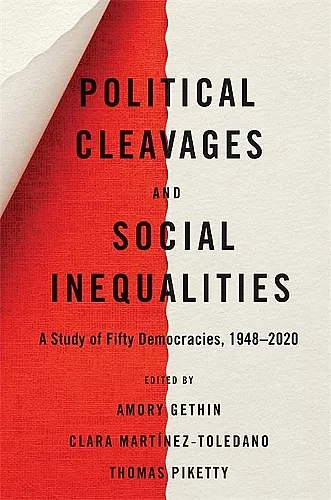Political Cleavages and Social Inequalities
A Study of Fifty Democracies, 1948–2020
Thomas Piketty editor Amory Gethin editor Clara Martínez-Toledano editor
Format:Hardback
Publisher:Harvard University Press
Published:28th Jan '22
Should be back in stock very soon

The empirical starting point for anyone who wants to understand political cleavages in the democratic world, based on a unique dataset covering fifty countries since World War II.
Who votes for whom and why? Why has growing inequality in many parts of the world not led to renewed class-based conflicts, seeming instead to have come with the emergence of new divides over identity and integration? News analysts, scholars, and citizens interested in exploring those questions inevitably lack relevant data, in particular the kinds of data that establish historical and international context. Political Cleavages and Social Inequalities provides the missing empirical background, collecting and examining a treasure trove of information on the dynamics of polarization in modern democracies.
The chapters draw on a unique set of surveys conducted between 1948 and 2020 in fifty countries on five continents, analyzing the links between voters’ political preferences and socioeconomic characteristics, such as income, education, wealth, occupation, religion, ethnicity, age, and gender. This analysis sheds new light on how political movements succeed in coalescing multiple interests and identities in contemporary democracies. It also helps us understand the conditions under which conflicts over inequality become politically salient, as well as the similarities and constraints of voters supporting ethnonationalist politicians like Narendra Modi, Jair Bolsonaro, Marine Le Pen, and Donald Trump.
Bringing together cutting-edge data and historical analysis, editors Amory Gethin, Clara Martínez-Toledano, and Thomas Piketty offer a vital resource for understanding the voting patterns of the present and the likely sources of future political conflict.
This book is a breakthrough in the existing literature on the politics of social inequality. Not merely is the analysis intensively data-based, it goes beyond the usual confines of a small number of western democracies to a set of fifty democracies (or semi-democracies) in different continents over many decades. The analysis throughout is highly sensible, informative, and insightful. -- Pranab Bardhan, University of California, Berkeley
This monumental book presents the first international and historical analysis of political cleavages and of their interplay with inequality. This is a must-read book for anyone wanting to understand electoral politics in today’s democracies—the rise of ‘identity politics’ in some countries but not others, and the multiplicity of possible futures for the dynamic of inequality. -- Gabriel Zucman, University of California, Berkeley
This impressive book will rapidly become the central reference point for systematically charting trends in voting alignment across the globe. By including nations from the global South alongside established liberal democracies, Gethin and his colleagues challenge endemic Western biases in political research and reveal the systematic ways that inequality and credentialism have redrawn voting patterns over recent decades. Gethin and his coauthors offer exactly the kind of big picture perspective which political activists and campaigners, as much as social scientists, will hugely appreciate. -- Mike Savage, author of The Return of Inequality
This ambitious collection tackles a set of timely questions about the interplay among inequality levels and trends, political preferences and electoral behavior, and voters’ demographic and economic characteristics. Ideally, the volume will land in the hands of diverse audiences concerned with political polarization and social inequalities—including multidisciplinary social scientists, political actors, and social activists. -- Janet C. Gornick, Director, Stone Center on Socio-Economic Inequality at The Graduate Center, City University of New York
Here is a welcome throwback to the ambitious political sociology of the mid-twentieth century. The analyses are solid and the geographical range is appealingly broad. The authors’ portraits of shifting social cleavages raise fascinating questions about the nature and implications of ‘class politics’ in the contemporary world. -- Larry M. Bartels, Vanderbilt University
Combining ambition with humility, this volume explores cross-national and temporal variation in the structure of political cleavages with an eye to explaining the conditions under which income and wealth inequality becomes a topic of political contestation (or not). Refreshingly, the volume sidesteps longstanding debates among political scientists and illustrates how looking for patterns in macro data can yield new insights. Harmonizing election surveys from fifty countries, the database assembled by Piketty and his collaborators itself represents a major contribution. -- Jonas Pontusson, University of Geneva
ISBN: 9780674248427
Dimensions: 235mm x 156mm x 47mm
Weight: 1089g
656 pages